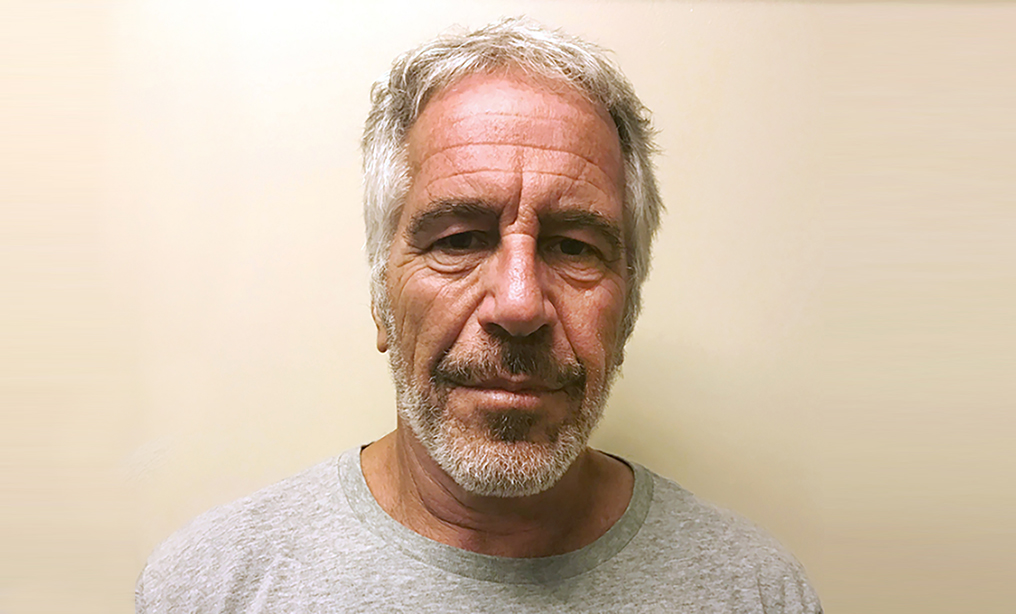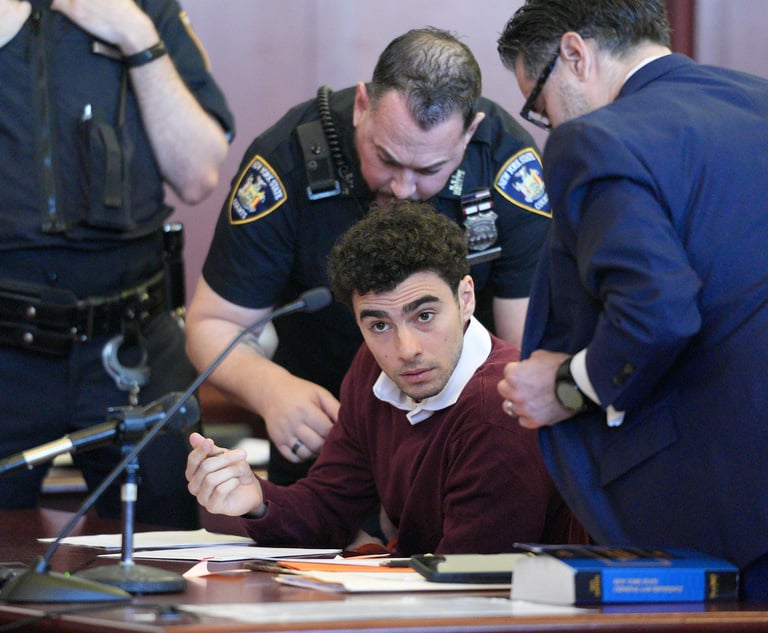FBI Opens Investigation into Jeffrey Epstein's Death
Epstein's suicide ends criminal proceedings against him, but several civil matters and official investigations are expected to move forward.
August 10, 2019 at 10:18 AM
7 minute read
 Jeffrey Epstein in 2017. (Photo: New York State Sex Offender Registry via AP)
Jeffrey Epstein in 2017. (Photo: New York State Sex Offender Registry via AP)
Jeffrey Epstein, the Manhattan- and South Florida-based financier who was held for charges of sex trafficking, was found dead in a secure housing unit of the federal Metropolitan Correctional Center in New York early Saturday morning.
Prison officials said Epstein was found unresponsive in his cell around 6:30 a.m. and was treated by jail staff and emergency responders. He was taken to a local hospital, where he was later pronounced dead.
The U.S. Department of Justice said the FBI was investigating the incident.
Epstein, 66, was awaiting trial in the Southern District of New York on charges that he ran an underage sex ring out of his homes in Manhattan and Palm Beach. Prosecutors in the Southern District of New York alleged that Epstein had paid girls as young as 14 for sex and to recruit new victims into his network.
The U.S. Attorney’s Office in Manhattan declined to immediately comment Saturday morning. Epstein’s lawyers, Boston-based Martin Weinberg of Martin G. Weinberg P.C. and Reid Weingarten of Steptoe & Johnson, did not respond to calls seeking comment on their client’s death.
U.S. Attorney General William Barr said in a statement that an FBI investigation had been opened into Epstein’s death.
“I was appalled to learn that Jeffrey Epstein was found dead early this morning from an apparent suicide while in federal custody,” Barr said. “Mr. Epstein’s death raises serious questions that must be answered. In addition to the FBI’s investigation, I have consulted with the Inspector General who is opening an investigation into the circumstances of Mr. Epstein’s death.”
Last month, Judge Richard Berman of the U.S. District Court for the Southern District of New York denied bail to Epstein, rejecting his lawyers’ request that he be allowed to post $100 million bond and wait out trial at his Manhattan townhouse.
A week after that decision came down, Epstein was found with injuries to his neck in what was suspected to have been a suicide attempt.
Berman’s bail denial was the subject of an appeal to the U.S. Court of Appeals for the Second Circuit, but review there would have been based on a steep “clear error” standard, a very high bar for reversal. Moreover, the Second Circuit held recently that wealthy defendants cannot use their resources to fund private security accommodations in lieu of pre-trial detention.
The Epstein case has a long history. The financier avoided federal criminal charges in 2008, after his legal team brokered a controversial plea deal with U.S. Attorney’s Office in Miami.
As a part of that agreement, Epstein pleaded guilty to two state prostitution charges and served 13 months in Palm Beach County jail, where he had work-release privileges and was allowed to continue his work as a money manager during the day.
The deal has drawn heavy scrutiny in recent months, with observers criticizing what they viewed as very lenient terms for Epstein’s confinement. U.S Labor Secretary Alexander Acosta, who negotiated the agreement as U.S. Attorney for the Southern District of Florida, resigned his post last month, and Florida Gov. Ron DeSantis this week directed the Florida Department of Law Enforcement to take over a criminal investigation of the case.
Epstein was arrested July 6 at Teterboro Airport in New Jersey, following an investigation by the FBI and the public-corruption unit of the U.S. Attorney’s Office in Manhattan. He pleaded not guilty to the charges.
A tentative trial date had been set for next June in New York, but Epstein’s attorneys said they would need until September 2020 to review voluminous discovery and to mount a defense that would raise constitutional issues linked to the non-prosecution agreement.
Geoffrey Berman, the U.S. Attorney in Manhattan, has declined to comment on whether there would be any more criminal indictments, saying he would not discuss “speculation” regarding alleged Epstein associates.
So far, no other persons have been charged with wrongdoing in the case.
Within hours, Epstein’s death had already started to raise questions about how such a high-profile defendant with a recent history of self-harm could have killed himself while in federal custody.
Epstein’s former civil lawyer, Michael Pike, of Pike and Lustig, LLP in West Palm Beach, Florida, said “what New York now has is a crime scene. I find it highly odd that someone … who allegedly attempted suicide weeks ago, has now been found unresponsive and declared dead. Epstein was a high-profile inmate, so I am confident surveillance and a full investigation will tell the full story as the FBI investigates. The question is was there substantial assistance from the inside or outside in connection with this event?”
Bruce Rogow, a South Florida-based law professor and attorney whose clients have included President Donald Trump, said all criminal proceedings in the matter will come to a “screeching halt,” with the New York case expected to be formally dismissed.
Other investigations may proceed, Rogow said in an email to ALM, including probes related to the 2008 plea entered into on Florida state prostitution charges.
“The Justice Department investigation of the [2008] plea agreement will continue but only as an internal administrative matter, ” Rogow said. “ The Florida Investigation of the Palm Beach County Sheriff’s Office work release procedures will continue if only to find out if anyone acted corruptly.”
While Epstein’s death ended the criminal case against him, multiple civil cases were expected to move forward.
David Boies, who represents one of Epstein’s accusers, said he would seek to hold anyone who may have aided Epstein responsible for the abuses.
“Jeffrey Epstein did not act, and could not have done what he did, alone,” Boies, a name partner with Boies Schiller Flexner in New York, said in a statement. “Justice demands that those who acted with him also be held to account.”
Lisa Bloom, who represents three Epstein accusers, said her clients’ case could proceed against Epstein’s estate, and called on its administrators to freeze all of Epstein’s assets for the victims.
“Victims deserve to be made whole for the lifelong damage he caused,” she said in a tweet. “We’re just getting started.”
A tranche of previously sealed legal document released Friday by order of the Second Circuit provided new details about Epstein’s connections and how his associates helped him recruit other young women and girls into his alleged ring.
The documents released on Friday came as part of a defamation suit brought by Epstein accuser Virginia Giuffre against a defendant who allegedly said she’s lying. The lawsuit includes allegations of involvement by “numerous” prominent American and foreign politicians as well as powerful business executives.
This content has been archived. It is available through our partners, LexisNexis® and Bloomberg Law.
To view this content, please continue to their sites.
Not a Lexis Subscriber?
Subscribe Now
Not a Bloomberg Law Subscriber?
Subscribe Now
NOT FOR REPRINT
© 2025 ALM Global, LLC, All Rights Reserved. Request academic re-use from www.copyright.com. All other uses, submit a request to [email protected]. For more information visit Asset & Logo Licensing.
You Might Like
View All
Special Counsel Jack Smith Prepares Final Report as Trump Opposes Its Release
4 minute read
Luigi Mangione Defense Attorney Says NYC Mayor’s Comments on Case Raise Fair Trial Concerns
4 minute read

Trending Stories
Who Got The Work
J. Brugh Lower of Gibbons has entered an appearance for industrial equipment supplier Devco Corporation in a pending trademark infringement lawsuit. The suit, accusing the defendant of selling knock-off Graco products, was filed Dec. 18 in New Jersey District Court by Rivkin Radler on behalf of Graco Inc. and Graco Minnesota. The case, assigned to U.S. District Judge Zahid N. Quraishi, is 3:24-cv-11294, Graco Inc. et al v. Devco Corporation.
Who Got The Work
Rebecca Maller-Stein and Kent A. Yalowitz of Arnold & Porter Kaye Scholer have entered their appearances for Hanaco Venture Capital and its executives, Lior Prosor and David Frankel, in a pending securities lawsuit. The action, filed on Dec. 24 in New York Southern District Court by Zell, Aron & Co. on behalf of Goldeneye Advisors, accuses the defendants of negligently and fraudulently managing the plaintiff's $1 million investment. The case, assigned to U.S. District Judge Vernon S. Broderick, is 1:24-cv-09918, Goldeneye Advisors, LLC v. Hanaco Venture Capital, Ltd. et al.
Who Got The Work
Attorneys from A&O Shearman has stepped in as defense counsel for Toronto-Dominion Bank and other defendants in a pending securities class action. The suit, filed Dec. 11 in New York Southern District Court by Bleichmar Fonti & Auld, accuses the defendants of concealing the bank's 'pervasive' deficiencies in regards to its compliance with the Bank Secrecy Act and the quality of its anti-money laundering controls. The case, assigned to U.S. District Judge Arun Subramanian, is 1:24-cv-09445, Gonzalez v. The Toronto-Dominion Bank et al.
Who Got The Work
Crown Castle International, a Pennsylvania company providing shared communications infrastructure, has turned to Luke D. Wolf of Gordon Rees Scully Mansukhani to fend off a pending breach-of-contract lawsuit. The court action, filed Nov. 25 in Michigan Eastern District Court by Hooper Hathaway PC on behalf of The Town Residences LLC, accuses Crown Castle of failing to transfer approximately $30,000 in utility payments from T-Mobile in breach of a roof-top lease and assignment agreement. The case, assigned to U.S. District Judge Susan K. Declercq, is 2:24-cv-13131, The Town Residences LLC v. T-Mobile US, Inc. et al.
Who Got The Work
Wilfred P. Coronato and Daniel M. Schwartz of McCarter & English have stepped in as defense counsel to Electrolux Home Products Inc. in a pending product liability lawsuit. The court action, filed Nov. 26 in New York Eastern District Court by Poulos Lopiccolo PC and Nagel Rice LLP on behalf of David Stern, alleges that the defendant's refrigerators’ drawers and shelving repeatedly break and fall apart within months after purchase. The case, assigned to U.S. District Judge Joan M. Azrack, is 2:24-cv-08204, Stern v. Electrolux Home Products, Inc.
Featured Firms
Law Offices of Gary Martin Hays & Associates, P.C.
(470) 294-1674
Law Offices of Mark E. Salomone
(857) 444-6468
Smith & Hassler
(713) 739-1250








